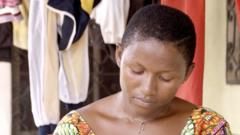In the damp shadows of Limbe, Cameroon, families mourn under the weight of loss as violence between separatists and government troops escalates. Ngabi Dora Tue recalls the heart-wrenching moment she learned her husband, Johnson Mabia, had been killed by armed separatists after a ransom was demanded for his release. His decapitated body left on the road serves as a grim reminder of the conflict that has gripped the anglophone regions of this predominantly francophone country.
The roots of this turmoil trace back to 1961, with a series of protests in 2016 against perceived marginalization by the central government transforming into a violent struggle for independence over nearly a decade. The Anglophone community, feeling stifled by the creeping influence of the francophone system in courts and institutions, organized to demand their rights. Unfortunately, the government's harsh response only fed the flames of unrest.
As fears mount, journalists like Blaise Eyong recount chilling tales of daily life, where the streets are blanketed with fear, filled with reports of abductions and killings. Over five million anglophone Cameroonians have been affected, many torn from their homes, and at least 6,000 lives lost amid the chaos, leading to cries for accountability in a war largely invisible to the world.
Efforts for peace, like the national dialogue in 2019, have failed to yield substantial results, and brutality continues unabated on both sides. The military has faced accusations of torture, unlawful arrests, and killings, while separatist groups are equally condemned for their violent tactics.
John, an anonymous survivor, shares the harrowing ordeal of torture at the hands of the military while being wrongfully accused of supporting separatists. The ongoing violence has made life unlivable; education has been halted with many schools shuttered, a loss that may reverberate for generations.
In a cruel twist, additional factions have emerged, complicating the conflict. Leaders like John Ewome patrolling the streets also face allegations of abuse, blurring the line between protector and aggressor. Meanwhile, the cycle of kidnappings persists, as desperate families remain trapped between two dangerous fronts.
As the fight rages on, hope for recovery seems dim for those like Ngabi Dora, who grapple with overwhelming grief and the harsh realities of widowhood at a young age. Families across anglophone regions contend with pain and uncertainty as they navigate a future overshadowed by loss and violence, leaving a desperate call for peace echoing through the troubled streets of Cameroon.



















